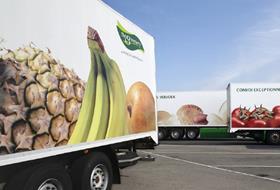
Netherlands-based fresh produce group The Greenery has announced its intention to set up a new cooperation model between the company, the cooperative and its members, citing shifts in market conditions and the changing needs of customers and growers as inspirations behind the company's desire to accelerate the introduction of the new model.
The group said in a statement that, as a market leader, its new approach will enhance its added value strategy while creating more room for growers to define their own style of modern entrepreneurship within the cooperative.
The Greenery said that it had observed a number of developments among its customers and its growers that influenced the market in which it operated: On the one hand, customers have stronger preferences for cooperation in the supply chain and for standards of quality and food safety. On the other hand, professionalisation and the increasing scale of agriculture have led to a desire among growers to change how they define their role as entrepreneurs. Therefore, the group said, personal service, close ties to the market and more involvement in and influence on commercial policy are key elements in this context. The new cooperation model is The Greenery’s response to these changing market conditions.
The proposal for a new cooperation model is not an isolated occurrence; The Greenery has already taken a number of steps to develop this aspect of the business. A new, transparent system of tariffs and levies has been introduced, the Sourcing NL department has been reorganised along product lines, and the number of links between the growers and the customers has been significantly increased. Subsequently, the changes announced are a logical next step, according to the group. The new developments generate more flexibility and focus for the company, while giving growers more freedom of choice in how they work in cooperation with the company.
'As a market leader, we are constantly developing. By taking this step forward, we aim to intensify our relationship with preferred suppliers, thus strengthening our position in retail,' explained Philip Smits, managing director of The Greenery. 'Having growers as exclusive preferred suppliers means a stronger focus on such services as supply chain management, shorter supply chains and category management.'
Theo Ammerlaan, chairman of the board for The Greenery UA cooperative, said: 'By taking this step, our members and the company together shape modern, market-oriented entrepreneurship in horticulture.'
The Greenery explained that, in the new model, the company and the cooperative are separated and positioned individually. The cooperative aims to remain a CMO-approved growers’ association that offers its members a wide range of services and acts as an ideal platform for combining supply. As a separate company, The Greenery will operate as an international commercial enterprise with direct and exclusive access to production.
The Greenery offers growers the opportunity to choose how they want to work with the company and how the value of their product will be developed. They have the choice to intensify the existing exclusive relationship with The Greenery. In this option, growers enter into a partnership with The Greenery that includes their total production, working more closely in commercial strategy, marketing and logistics.
Two new forms of partnership are also set to be introduced: a transaction relationship and an auction relationship. The transaction relationship gives growers the freedom to choose to develop their own sales policy targeting the Dutch wholesale market and Dutch exporters. An auction relationship means that their products will be sold by Dutch clock auction. The growers can make use of the services that The Greenery offers, based on the form of cooperation they choose. In all cases, The Greenery will continue to serve the national and international retail market as a supply chain specialist and experienced service provider.
During a board meeting on 25 August 2009, the executive management of The Greenery presented the new cooperation model to the board of The Greenery UA cooperative. The department boards and PMACs (Product Market Advisory Committees) have now also been notified. The details of the cooperation model will be developed further in the coming months; in addition, extensive consultation on the proposal will take place with the Supervisory Board and the Works Council. A definitive decision is expected in the Members Assembly on 18 December. This timeline is in accordance with the customary consultation and decision-making procedures for the company.
'We are aware that there are currently many questions,' Mr Smits added. 'But we want to discuss the proposals and make the decisions with all due care, in close consultation with the members.'



